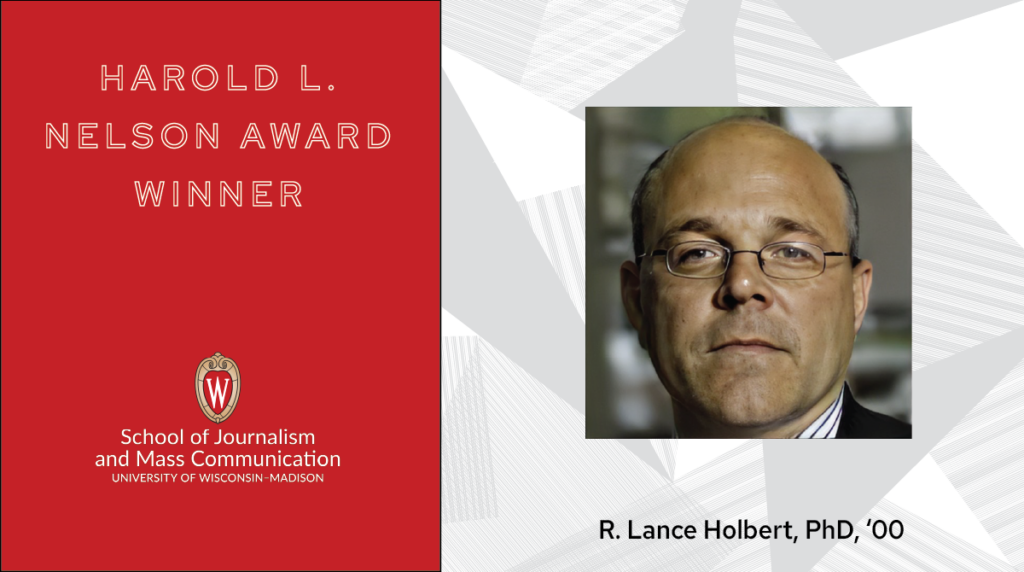
Lance Holbert is a Professor of Communication and Social Influence at Temple University’s Klein College of Media and Communication and the winner of the School of Journalism and Mass Communication’s 2023 Harold L. Nelson Award. He studies persuasion-based processes of media influence within the context of politics. He has authored or co-authored over 100 peer-reviewed journal articles, books or book chapters. Professor Holbert is also a Distinguished Research Fellow in the University of Pennsylvania’s Annenberg Public Policy Center, an International Communication Association Fellow, and he just wrapped up a stint as Editor-in-Chief of Journal of Communication. He served as Chair of ICA’s and NCA’s Mass Communication Divisions, as well as NCA’s Political Communication Division. He is also a past recipient of the NCA Mass Communication Division’s Teacher of the Year Award.
What have you been up to since your time in the J-School?
I have been wading knee-deep in the knowledge business for 20+ years. The scholarly endeavor involves the generation, dissemination and application of knowledge. On the generation front, I am a persuasion scholar who focuses on media effects in the context of politics. A primary focus of my work is on studying the complementarity of varied, seemingly disparate communicative acts in determining democratic outcomes that span the hierarchy of effects. Rather than studying varied types of communicative acts being in competition with one another for influence, I tend to focus on communication-to-communication dynamics. As I learned at UW-Madison, Steven Chaffee always emphasized that the most likely effect of communication is more communication. On the dissemination front, I have taught a wide variety of undergraduate and graduate courses having held faculty positions at the University of Missouri, the University of Delaware, The Ohio State University, the University of South Carolina, and Temple University. On the knowledge application front, my current grant-based work focuses on working with colleagues in computer science on digital tools to aid local news.
What are you focused on right now?
I am just wrapping up a four-and-a-half-year stint as Editor-in-Chief of Journal of Communication. It is a field-general outlet that attracts work from all corners of the field of communication (as well as works from other like-minded fields). We received over 3,000 unique submissions over that period of time. The EIC position is a unique vantage point to observe what the field is doing well and what the field is doing poorly. As a result of this position, I have been generating a series of field-general publications focused on a few things the field could be doing better in terms of theory building. I suspect I will have another half a dozen points to address over the course of the next year and a half.
What’s the most important lesson you learned in the J-School that helped you in your career?
How to go about your business the right way. I was very fortunate to be trained by faculty members who were the top in their chosen profession. People like Drs. Michael Pfau, Jack McLeod and Dhavan Shah showed me how to tackle a research project. Also, my cohort and the cohorts directly in front of me were filled with up-and-coming scholars who have done amazing work over the course of their careers. People like Chip Eveland, Patricia Moy, Dietram Schuefele and Nojin Kwak set a very high bar. I was green enough not to know any better, but these folks were well outside the norm for what it means to be a productive graduate student. I simply tried to follow their lead and that decision has paid continued benefits for the better part of two decades.
When you weren’t in class, how’d you spend your free time at UW?
Like most people in Madison (and the State of Wisconsin) I worked hard at refining my beer consumption patterns. UW was a work hard-play hard place in the late 1990s and that suited me quite well. In the summers, there was the school’s softball team. So much fun. I am a washed-up, former athlete and a huge sports fan. So, I developed a Badger fandom during my time in Madison that remains intact to this day — attended any and all types of UW sporting events. Go Badgers!
If you were to give your college self a piece of advice, what would it be?
Remain humble in your knowledge endeavors. Each project results in more questions than answers. Intellectual humility offers a range of direct and indirect benefits.
What does UW-Madison mean to you?
Everything. I was working in politics in Washington, D.C., prior to making my way to Madison. The shift to joining a doctoral program was a true leap of faith. UW-Madison, the School of Journalism and Mass Communication, and its people gave me a foundation from which to build a career. My time in Madison served as a key transition point in my life and I count my blessings each day for having made the decision to come to the University of Wisconsin-Madison.